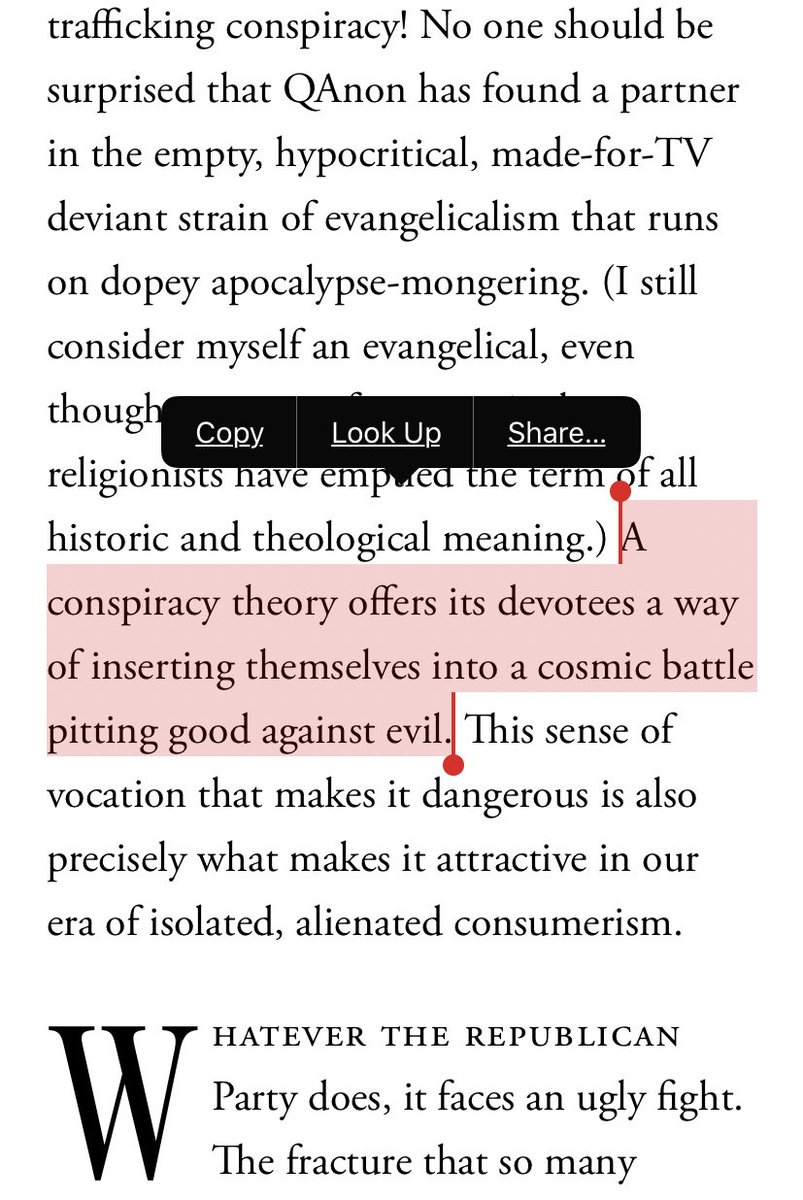It neither proves nor disproves because it reveals an important flaw—perhaps, strategy?—in the argument. https://twitter.com/jackmjenkins/status/1350830099298455553
The problem with assuming conspiracy theories have become a substitute for religion is that it assumes both can’t be held by the same person simultaneously, and that communities—say, religious groups or media ecosystems—can’t reinforce both at the same time.
This is an ideologically expedient argument to make because it assumes and reinforces the idea religions are closed cultural systems, free from any outside influences or changes over time, esp those that could damage or corrupt it.
If conspiracy theories are a substitute for religion—either one or the other—then white Christians don’t need to reckon with how their fellow Christians adopted and promoted conspiracy theories *as* Christians.
For example, what else “offers devotees a way of inserting themselves into a cosmic battle”? Christianity! And not the “deviant” or “dopey” kinds (his words & categories, not mine). Good/evil, cosmic battles are pretty mainstream and popular, esp in evangelical circles
Am I saying all of Christianity caused this violence? No. What I AM trying to say is that believing in conspiracy theories is not as far fetched as Sasse asserts, & his assertion separates different “believers” in a way that avoids (self)reflection about their connections.
Here are some works that present a different view. (Here begins a thread within the thread)
Eg: There’s a reason @kkdumez’s Jesus & John Wayne has sold out multiple print runs. A compelling and persuasive take https://kristindumez.com/books/jesus-and-john-wayne/
Eg: There’s a reason @kkdumez’s Jesus & John Wayne has sold out multiple print runs. A compelling and persuasive take https://kristindumez.com/books/jesus-and-john-wayne/
Some insurrectionists claimed this was their 1776 moment. One parallel is that it was also popular for Christian colonists to incorporate magic and occult practices in their faith. See Jon Butler’s “Magic & Occult” chapter in Awash in a Sea of Faith https://www.hup.harvard.edu/catalog.php?isbn=9780674056015
consumer culture shaping evangelicalism? check out @DanielVacaIII’s Evangelicals Incorporated https://www.hup.harvard.edu/catalog.php?isbn=9780674980112
What about the role persecution and religious freedom operating here? See Melani McAlister’s Kingdom of God Has No Borders, esp “Persecuted Body” chapter https://global.oup.com/academic/product/the-kingdom-of-god-has-no-borders-9780190213428
And we can’t understand this moment without thinking about the profound whiteness and white supremacy operating in these circles. Mark your calendars for the March release of @AntheaButler’s White Evangelical Racism https://uncpress.org/book/9781469661179/white-evangelical-racism/

 Read on Twitter
Read on Twitter


